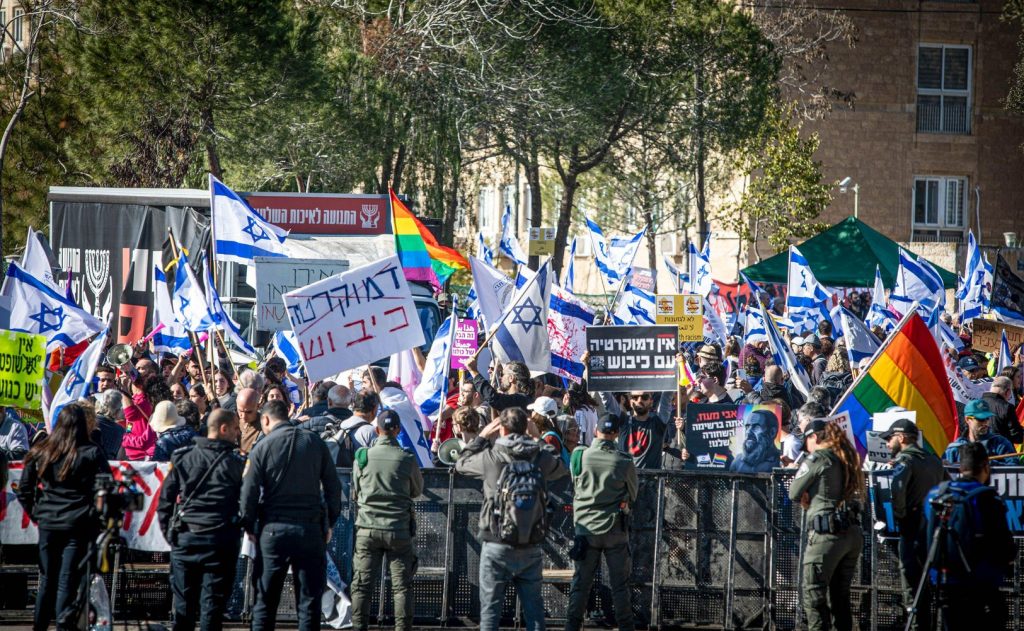Australia/Israel Review
Can’t they just compromise?
Jan 27, 2023 | Shmuel Rosner

In the early Nineties, a controversial plan was passed by a small majority in Israel’s Knesset, over the objection of half the Israeli population. It was a dramatic shift for Israel that the Government decided to implement using political trickery, without much regard for the sensibilities of the opposition.
It was also an irreversible decision: Israel committed itself internationally to the Oslo Accords with the PLO. And for many right-wing Israelis, this is proof that the current opposition is dishonest as it cries foul over the initiative to implement a radical reform of the justice system, strengthening the parliament and weakening the courts and the legal advisors.
There are similarities between then and now. In both cases, the proposed change is dramatic. In both cases, Israel is deeply divided. In both cases, the opposition took to the streets. There are also differences: the Oslo Accords came as a surprise, the broad concept of the legal reforms was put before the voters prior to election day. The Oslo Accords were in many ways unalterable. The legal reform can be reversed when a new government is elected. But there’s also another important difference: the Oslo Accords were a political decision, a change of policy. The legal reforms are a change of the rules of the political game itself.
That’s why the opposition seems so angry and desperate, and that’s why it feels as if this change is more profound than previous governmental alterations of policies. A country divided over its vision for the future can stick together if the rules of how decisions are made are clear and legitimate. But when one camp feels that it is about to be cheated out of the game – losing its ability to function in a free society – it immediately radicalises.
This is what we see in Israel today: the radicalisation of a perplexed opposition. For many Israelis, what’s about to happen is not a change – for good or bad – in policy. It is a change in how Israel functions as a society. It is a change in Israel’s identity as a liberal democracy.
On January 14, 80,000 protestors took to the streets in the pouring rain. And that was just the beginning, the opening salvo of a long battle. But there are two problems: first, the coalition has a majority to pass the reform; second, the opposition is not always clear on what it wants.
Some opposition leaders believe that all proposed changes are damaging and even reprehensible. They want the majority to forget its pre-election promises and forgo all plans for reform. But that’s not a realistic expectation, nor a fair one. The coalition has an agenda. It was elected to implement its agenda. That the opposition who lost the election opposes this agenda has little relevance today. Elections are held for coalitions to win and make changes.
Other opposition leaders understand that a change must take place, both for political reasons, and (some recognise) because the legal system is not perfect and cannot be immune to all demands for alterations. They believe, with good reason, that the Government is engaged in overreach, so they propose to have a discussion and try to mutually agree on the changes that could be acceptable to both sides.
But such negotiations have not yet materialised. The ruling coalition suspects, not without reason, that all proposals for consultation are merely a delaying tactic aimed at torpedoing all reforms. Also, it has a majority and feels little pressure to compromise. The opposition is divided and incoherent, and it’s not clear that anyone could speak for it with an authoritative voice.
So, what’s going to happen? It is likely to get worse before it gets better. The Knesset has begun its legislative process. The opposition is geared toward more protest, and possibly other measures. And everybody is shouting – that is to say: currently it seems impossible to have a calm conversation.
Shmuel Rosner is a Senior Fellow at the Jewish People Policy Institute (JPPI) as well as an analyst for Kan News TV (Israel’s public television network). He is the founder and editor of the data-journalism initiative themadad.com. He also writes a weekly column for the Jewish Journal in LA and for Maariv in Israel. © Jewish Journal (jewishjournal.com), reprinted by permission, all rights reserved.
Tags: Israel






